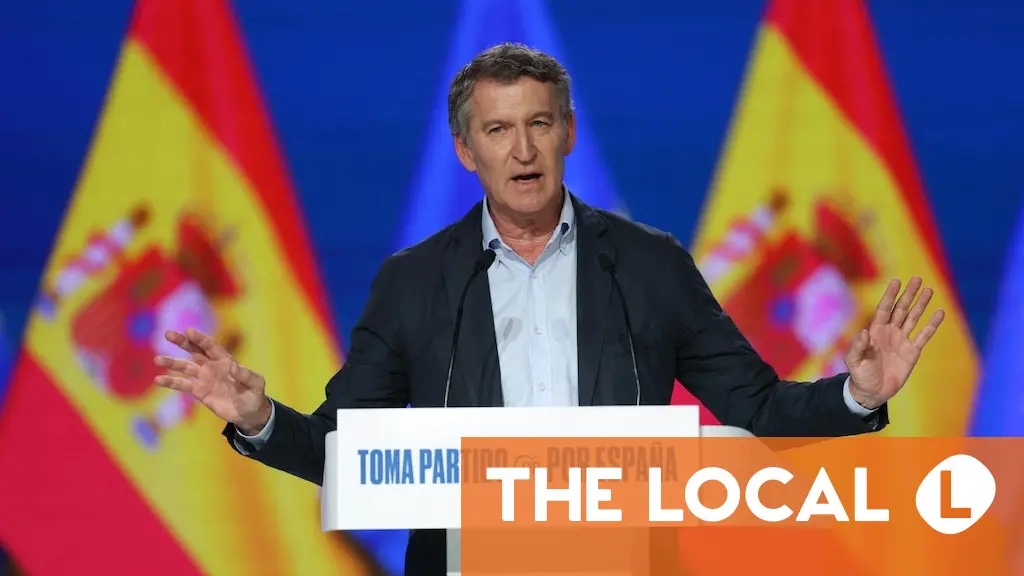The 10 migration laws that will impact foreigners if Spain's PP reaches power

Over the past weeks, Spain's People's Party has proposed numerous changes to immigration legislation which will have a big impact on foreigners in the country if the centre-right party wins the next general election.
Ever since recent polls showed that the Partido Popular is losing a considerable share of votes to far-right party Vox, PP leader Alberto Núñez Feijóo has taken it upon himself to portray his party as one that will address the concerns of Spaniards who are worried about immigration in the country.
"Every immigrant is not a victim, as the PSOE maintains, nor a criminal by default, as Vox claims," Feijóo said recently.
"Neither of these extremes is true, and consequently, the solution is neither to legalise them all nor to throw them all into the sea. It is to establish order and apply the law once and for all".
The Galician politician is thus looking to come across as a leader which will be tough on migration without being too radical.
Accompanying this change of rhetoric is the PP's recently published new immigration agenda, where several measures have been proposed which would impact foreigners' residency options, access to Spanish citizenship and more. Here are the standout points.
Points-based visa system
The PP has suggested that a points-based visa system be introduced to control the entry of migrants seeking jobs in sectors which need more workers, favouring those who adapt ‘better’ to Spanish culture. It essentially means more priority would be given to those who want to work in positions in-demand, as well as those from Latin America who can already speak Spanish.
READ MORE: Spain's PP calls for points-based visa system for foreigners
Less bureaucracy on immigration matters
Spain's main opposition party also wants to create a single authority when it comes to immigration, in order to end the current dispersion of powers among ministries and administrations. They believe this lack of coordination creates blockages, contradictions, and delays in return and integration processes.
More deportations
The PP has advocated for a zero-tolerance policy towards immigrants convicted of serious crimes or repeat offenders, which in practice would force said criminals to leave Spain. It also plans to extend the maximum time migrants can be kept in Foreigner Detention Centres and revoke residence permits for those involved in criminal activities or radicalisation processes.
International cooperation
The PP also calls for a review of bilateral agreements with nations that do not cooperate with Spain when it comes to taking back citizens of their countries who are living illegally in Spain or are facing deportation, no doubt mainly referring to Morocco.
It also warns that using migration as a tool for political pressure will have diplomatic consequences. "The plan will also take into account the commitment of countries to our immigration policy. If they help us restore order, they will be rewarded; and if they encourage disorder, people coming from those countries will obviously not be granted visas," Feijóo added.
Strengthening borders
A big part of the PP's migration agenda is dedicated to strengthening borders and advocates for a new European Pact on Migration and Asylum. They want to increase resources and strengthen surveillance in high-pressure areas such as the Canary Islands, Ceuta, Melilla, and the Strait of Gibraltar. They also hope to strengthen the role of the European agencies operating in third countries, such as Frontex, providing training and materials to countries of origin.
Make it impossible for overstayers to get residency
The PP has proposed toughening up the arraigo residency process if it returns to power, pledging that overstayers will no longer get residency without evidence of contribution or integration. Arraigo is the process that allows any non-European citizen who has been living in Spain illegally for a certain amount of time to obtain residency and legalise their status. This means that it could be impossible for overstayers and undocumented migrants to regularise their residency.
READ ALSO: Spain's opposition plans to make it impossible for overstayers to get residency
Formal commitment to Spain
Feijóo has called for the creation of a "letter of commitment" to be signed by immigrants who want to live and work in Spain. They will have to commit to comply with the law, to respect Spanish customs and the Spanish and European values of freedom, tolerance and pluralism, according to the PP leader.
READ ALSO: PP proposes foreigners sign 'letter of commitment' to live in Spain
No permanent residency without integration
Feijóo has also proposed tightening up access to permanent residence permits by linking them to employment and social integration, rather than simply time spent in the country.
"Long-term residence permits will depend on effort, not on calendars. In general, it will be granted based on criteria of contribution, work and integration, not mere permanence in Spain," a PP policy document stated.
READ ALSO - 'No permanent residency without integration': Spain's PP warns foreigners
Tougher language and cultural exams for Spanish citizenship
They also want to tighten the requirements for immigrants to gain Spanish nationality by raising "the linguistic, cultural, and constitutional standards". One of the main parts of this is that the language requirement will be raised to B2 and "a reinforced test of institutional, legal, cultural, and historical knowledge will be implemented”. The B2 level is two-levels above the current A2 requirement.
READ ALSO: Opposition party calls for tougher language and culture exams for Spanish citizenship
Asylum and reunification
The PP has also proposed speeding up asylum processing through a list of "safe countries", as well as having stricter controls. Regarding family reunification, it favours raising the financial requirements and implementing anti-fraud controls to ensure the authenticity of family ties.
Please sign up or log in to continue reading
thelocal





